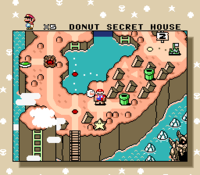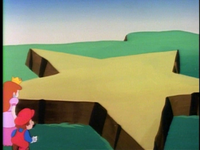Star Road (Super Mario World): Difference between revisions
m (Text replacement - "(\| *)Jap([RMCN\d]* *=)" to "$1Jpn$2") |
|||
| (83 intermediate revisions by 46 users not shown) | |||
| Line 1: | Line 1: | ||
{{ | {{italic title|id=yes}} | ||
[[ | [[File:SMW Star Road (Donut Plains).png|thumb|[[Donut Plains]]' Star Road in ''Super Mario World'']] | ||
'''Star Roads''' | '''Star Roads''' are stars that act as warp points to other locations, most notably in ''[[Super Mario World]]''. | ||
==History== | |||
===''Super Mario World''=== | |||
[[File:Star Road.png|frame|left]] | |||
Star Roads debut in ''Super Mario World'', connecting five points in [[Dinosaur Land]] to [[Star World]]. They are unlocked by finding secret exits in different [[level]]s. When entering a Star Road, [[Mario]] or [[Luigi]] spins around rapidly before moving upwards and teleporting to Star World. | |||
When in Star World, the secret exit of each level allows Mario or Luigi to move to the next Star Road, regardless if he has encountered it in Dinosaur Land first. If the player goes to a Star Road in Star World without beating the level in Dinosaur Land that leads to it, the road will show on the map, but Mario or Luigi will not be able to move forward towards the unbeaten Dinosaur Land level. However, the Star Road in the [[Valley of Bowser]] is an exception, and it allows Mario or Luigi to enter [[Bowser's Castle]] this way. | |||
== | ===''Super Mario World'' television series=== | ||
[[ | [[File:CartoonStarRoad.png|thumb|Mario and Princess Toadstool rush to a Star Road, as seen in the ''Super Mario World'' cartoon episode "King Scoopa Koopa."]] | ||
Though never named, Star Roads | Though never named, Star Roads make at least two appearances in the [[Super Mario World (television series)|''Super Mario World'' cartoon]]. They serve an identical purpose, being able to warp people to Star World (or the "Star Path," as it is called on the show), and appear only alongside the Star Path itself. The cartoon depicts Star Roads as large star-shaped structures found on high cliffs; the only major difference between the Star Roads of the game and those of the show is that the ones seen on the show lack eyes and do not stand upright. | ||
[[Category: | Star Roads debut in "[[Send in the Clown]]," where Mario, Luigi, [[Princess Peach|Princess Toadstool]], and [[Yoshi]] use a Star Road to access [[Bowser's Castle|Neon Castle]] through the Star Path. Their second and final appearance is in "[[King Scoopa Koopa]]," where Mario and Toadstool use a Star Road to evade pursuit from a group of cave people-turned-[[Chickadactyl]]s. | ||
The fact that both Star Roads featured in the show are seemingly found on the same cliff may indicate that they are the same Star Road, or perhaps that only one Star Road exists in the show. However, the former is more likely, as both Star Roads are shown to be near or within the limits of [[Dome City]]. Most of the Star Roads on the Star Path itself (save for one seen in the episode "King Scoopa Koopa") are replaced by [[Warp Pipe]]s instead. "King Scoopa Koopa" shows that the Warp Pipes act as the endpoint of Star Roads, while "Send in the Clown" depicts the landing point of Star Roads as a varying area on the Star Path. Both episodes show that these Warp Pipes have the same purpose as the Star Roads from the game. | |||
===''Mario Sports Mix''=== | |||
The Star Road is the [[Star Cup]]'s alternate route in ''[[Mario Sports Mix]]''. If players complete missions during the road, it will become a big star for them to jump through, sending them back to the normal tournament for the final match. | |||
==Names in other languages== | |||
{{foreign names | |||
|Jpn=スターロード | |||
|JpnR=Sutā Rōdo | |||
|JpnM=Star Road | |||
|Chi=星星之路 | |||
|ChiR=Xīngxīng zhī Lù | |||
|ChiM=Star Road | |||
|Fre=Route etoile | |||
|FreM=Star road | |||
|Ger=Sternenstrasse | |||
|GerM=Star road | |||
|Ita=Strada delle stelle<ref>{{cite|title=''[[Super Mario World]]'' instruction booklet|publisher=Nintendo|language=it|page=21}}</ref> | |||
|ItaM=Stars' Road | |||
|Por=Estrada Estelar | |||
|PorM=Stellar Road | |||
|PorC=<ref>{{cite|archive=web.archive.org/web/20210719091730/https://datassette.nyc3.cdn.digitaloceanspaces.com/manuais/super_mario_world_br.pdf|deadlink=y|title=''Super Mario World'' Brazilian instruction booklet|format=PDF|page=21}}</ref> | |||
|Spa=Camino estelar | |||
|SpaM=Star road | |||
}} | |||
==References== | |||
<references/> | |||
{{Stars}} | |||
{{SMW}} | |||
{{SMW TV}} | |||
[[Category:Stars]] | |||
[[Category:Dinosaur Land]] | |||
[[Category:Mario Sports Mix]] | |||
[[Category:Super Mario World]] | |||
[[Category:Super Mario World (television series)]] | |||
[[it:Strada delle stelle]] | |||
Latest revision as of 16:13, January 7, 2025

Star Roads are stars that act as warp points to other locations, most notably in Super Mario World.
History[edit]
Super Mario World[edit]
Star Roads debut in Super Mario World, connecting five points in Dinosaur Land to Star World. They are unlocked by finding secret exits in different levels. When entering a Star Road, Mario or Luigi spins around rapidly before moving upwards and teleporting to Star World.
When in Star World, the secret exit of each level allows Mario or Luigi to move to the next Star Road, regardless if he has encountered it in Dinosaur Land first. If the player goes to a Star Road in Star World without beating the level in Dinosaur Land that leads to it, the road will show on the map, but Mario or Luigi will not be able to move forward towards the unbeaten Dinosaur Land level. However, the Star Road in the Valley of Bowser is an exception, and it allows Mario or Luigi to enter Bowser's Castle this way.
Super Mario World television series[edit]
Though never named, Star Roads make at least two appearances in the Super Mario World cartoon. They serve an identical purpose, being able to warp people to Star World (or the "Star Path," as it is called on the show), and appear only alongside the Star Path itself. The cartoon depicts Star Roads as large star-shaped structures found on high cliffs; the only major difference between the Star Roads of the game and those of the show is that the ones seen on the show lack eyes and do not stand upright.
Star Roads debut in "Send in the Clown," where Mario, Luigi, Princess Toadstool, and Yoshi use a Star Road to access Neon Castle through the Star Path. Their second and final appearance is in "King Scoopa Koopa," where Mario and Toadstool use a Star Road to evade pursuit from a group of cave people-turned-Chickadactyls.
The fact that both Star Roads featured in the show are seemingly found on the same cliff may indicate that they are the same Star Road, or perhaps that only one Star Road exists in the show. However, the former is more likely, as both Star Roads are shown to be near or within the limits of Dome City. Most of the Star Roads on the Star Path itself (save for one seen in the episode "King Scoopa Koopa") are replaced by Warp Pipes instead. "King Scoopa Koopa" shows that the Warp Pipes act as the endpoint of Star Roads, while "Send in the Clown" depicts the landing point of Star Roads as a varying area on the Star Path. Both episodes show that these Warp Pipes have the same purpose as the Star Roads from the game.
Mario Sports Mix[edit]
The Star Road is the Star Cup's alternate route in Mario Sports Mix. If players complete missions during the road, it will become a big star for them to jump through, sending them back to the normal tournament for the final match.
Names in other languages[edit]
| Language | Name | Meaning | Notes |
|---|---|---|---|
| Japanese | スターロード[?] Sutā Rōdo |
Star Road | |
| Chinese | 星星之路[?] Xīngxīng zhī Lù |
Star Road | |
| French | Route etoile[?] | Star road | |
| German | Sternenstrasse[?] | Star road | |
| Italian | Strada delle stelle[1] | Stars' Road | |
| Portuguese | Estrada Estelar[2] | Stellar Road | |
| Spanish | Camino estelar[?] | Star road |
References[edit]
- ^ Super Mario World instruction booklet. Nintendo (Italian). Page 21.
- ^ Super Mario World Brazilian instruction booklet (PDF). Page 21. Archived July 19, 2021, 09:17:30 UTC from the original via Wayback Machine.
